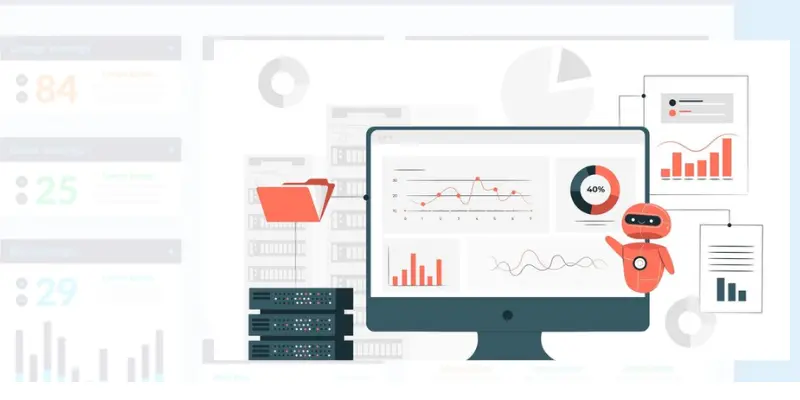Robotic Process Automation (RPA) is revolutionizing how businesses handle repetitive and mundane tasks by automating operations. However, automation alone is insufficient; continuous improvement is essential for maximizing efficiency. Power BI, a powerful business intelligence tool, is critical in analyzing data and offering actionable insights. Businesses can enhance productivity and streamline operations by integrating Power BI automation with RPA process improvement. If you want to dive deeper into automation, RPA Training in Bangalore offers hands-on courses to help you master these skills.
Power BI and RPA
Power BI is a business intelligence tool that helps businesses visualize and analyze their data to make data-driven decisions. RPA, on the other hand, automates manual processes by using bots, significantly reducing the workload for human employees. While RPA enhances productivity, continuous analysis and refinement are crucial for long-term success. This is where Power BI comes into play, using its analytical power to drive RPA process improvement.
The synergy between Power BI and RPA enables organizations to track RPA performance, identify inefficiencies, and optimize their workflows over time. This data-driven feedback loop not only improves productivity but also ensures smoother operations.
To enhance data analysis in Power BI, integrating Excel as a data source can significantly streamline workflows. By importing Excel files into Power BI, users can take advantage of Excel’s powerful formulas and Power BI’s visualization capabilities, creating dynamic, interactive reports that provide deeper insights and drive data-driven decision-making. Enrol now at the Advanced Excel Course in Bangalore.
Real-Time Monitoring with Power BI Automation
A significant advantage of integrating Power BI automation with RPA is the ability to monitor bot performance in real time. Power BI dashboards can track critical metrics such as task completion time, error rates, and overall efficiency. This real-time data visualization helps businesses understand whether their RPA systems function optimally. To gain these valuable insights for your projects, consider enrolling in Power BI Training in Bangalore to learn how to build custom dashboards that monitor performance and enable quick decision-making.
By leveraging automated alerts in Power BI, businesses can receive notifications when a bot’s performance deviates from expected norms. For instance, if a bot takes too long to complete a task or if error rates increase, the system can trigger a warning. This immediate feedback allows teams to proactively address issues and ensures continuous RPA process improvement.
Analyzing Historical Data for RPA Improvement
While real-time monitoring is crucial, analyzing historical data is equally important. Power BI automation excels in this area, allowing businesses to examine long-term RPA performance. Companies can uncover recurring issues or identify processes that require improvement through detailed trend analysis. For those looking to build a deeper understanding of how to use Power BI for analyzing historical data, Training Institutes in Bangalore provide specialized courses focusing on data analysis for RPA.
For instance, if your RPA processes are consistently lagging, Power BI can offer insights into what may be causing these delays. Such data-driven improvements can significantly impact your overall business performance.
Streamlining RPA Workflows with Data Insights
Another key benefit of integrating Power BI automation with RPA is the ability to streamline workflows. The data visualized in Power BI helps businesses identify unnecessary steps in their automation processes or outdated protocols that need upgrading. By simplifying workflows, RPA bots can execute tasks faster and more accurately, improving outcomes and reducing operational costs.
For example, if a company identifies that a particular RPA process encounters frequent delays, it can investigate the root cause using Power BI. The insights gained can help eliminate inefficiencies, improve speed, and ensure that the bots perform at their full potential.
Predictive Analytics for RPA Process Improvement
One of Power BI’s most powerful features is predictive analytics, which helps businesses anticipate future challenges and opportunities. Using predictive modelling, Power BI can forecast how an RPA bot is likely to perform in the future based on past trends. This foresight enables companies to adjust preemptive workflow, ensuring continuous RPA process improvement.
Understanding predictive analytics in Power BI can be a game-changer for businesses looking to stay ahead. For those who want to master this skill, Power BI Training in Marathahalli offers specialized courses focusing on predictive modelling and its application to RPA.
Enhancing Decision-Making with Power BI Automation
Effective decision-making is crucial in driving RPA process improvement, and Power BI plays a vital role in this. By visualizing complex data in easy-to-understand dashboards and reports, Power BI empowers decision-makers with actionable insights. Leaders can quickly assess their RPA initiatives’ performance, identify improvement areas, and make informed choices that positively impact business operations.
Additionally, Power BI enables collaborative decision-making by allowing multiple stakeholders to view and interact with the same data. This fosters a more cohesive and aligned approach to RPA process improvement, ensuring that everyone within the organization works towards the same objectives.
Achieving Continuous RPA Process Improvement with Power BI
Incorporating Power BI automation into RPA workflows provides businesses with a powerful tool for monitoring, analyzing, and continuously improving their automation efforts. Real-time monitoring, historical data analysis, predictive analytics, and data-driven decision-making are just a few ways Power BI enhances RPA systems.
By harnessing the power of Power BI automation, businesses can achieve continuous RPA process improvement, optimize their operations, reduce costs, and increase efficiency. Whether you want to streamline existing RPA workflows or introduce new automation processes, RPA Training in Marathahalli and Power BI can help drive sustained success in today’s competitive business landscape.
With its ability to provide detailed insights and guide strategic decisions, Power BI remains a critical element for any business looking to maximize the value of RPA.

